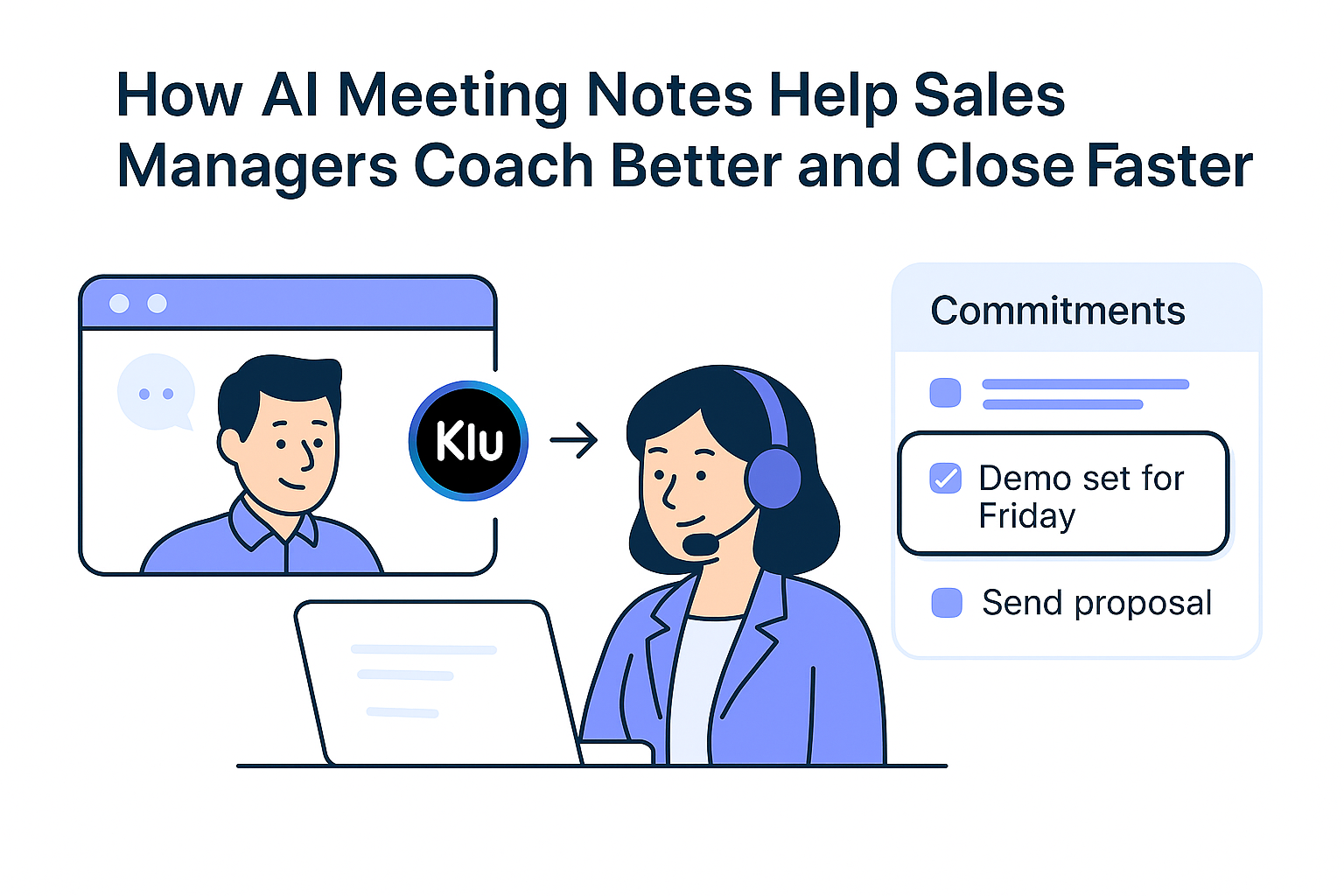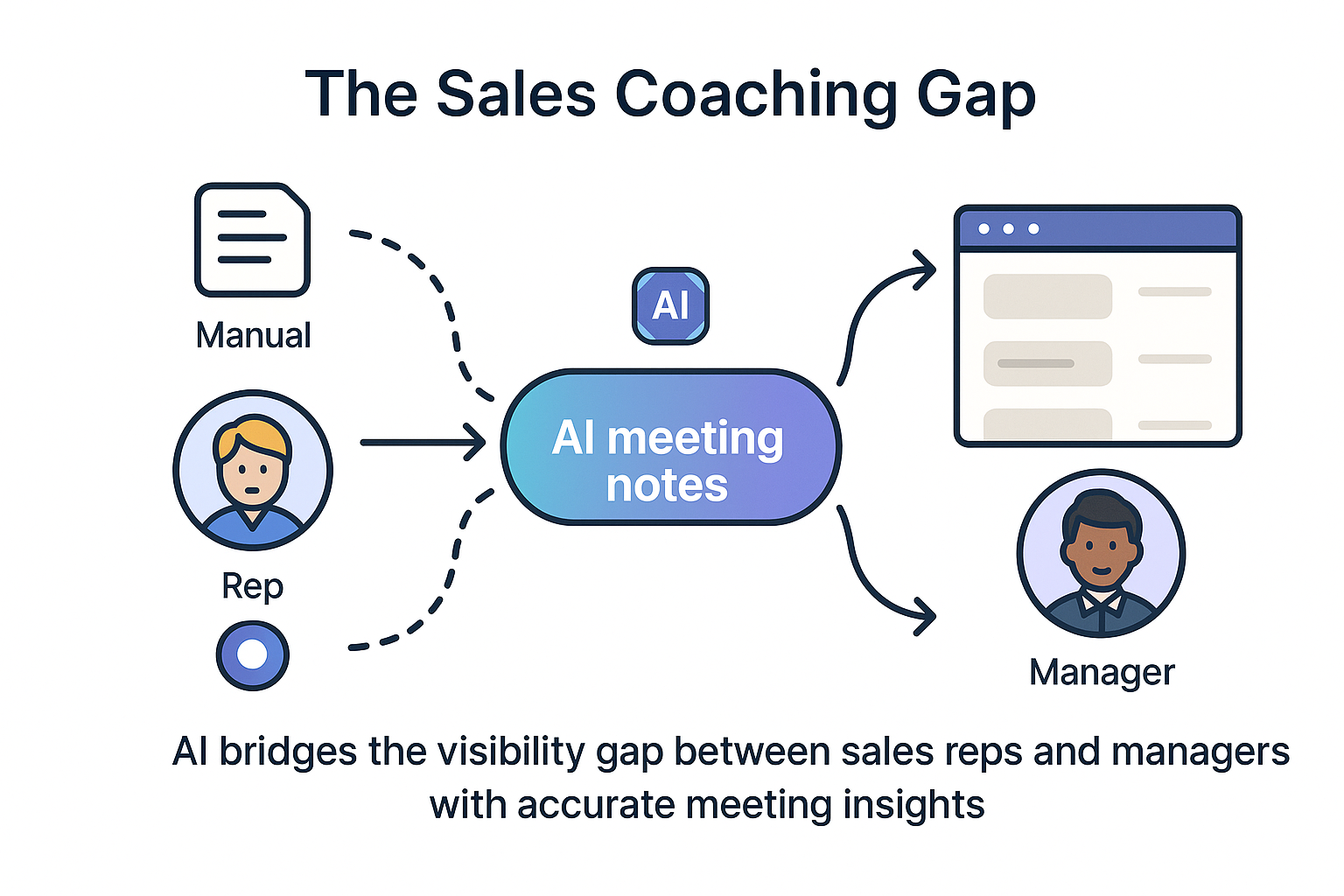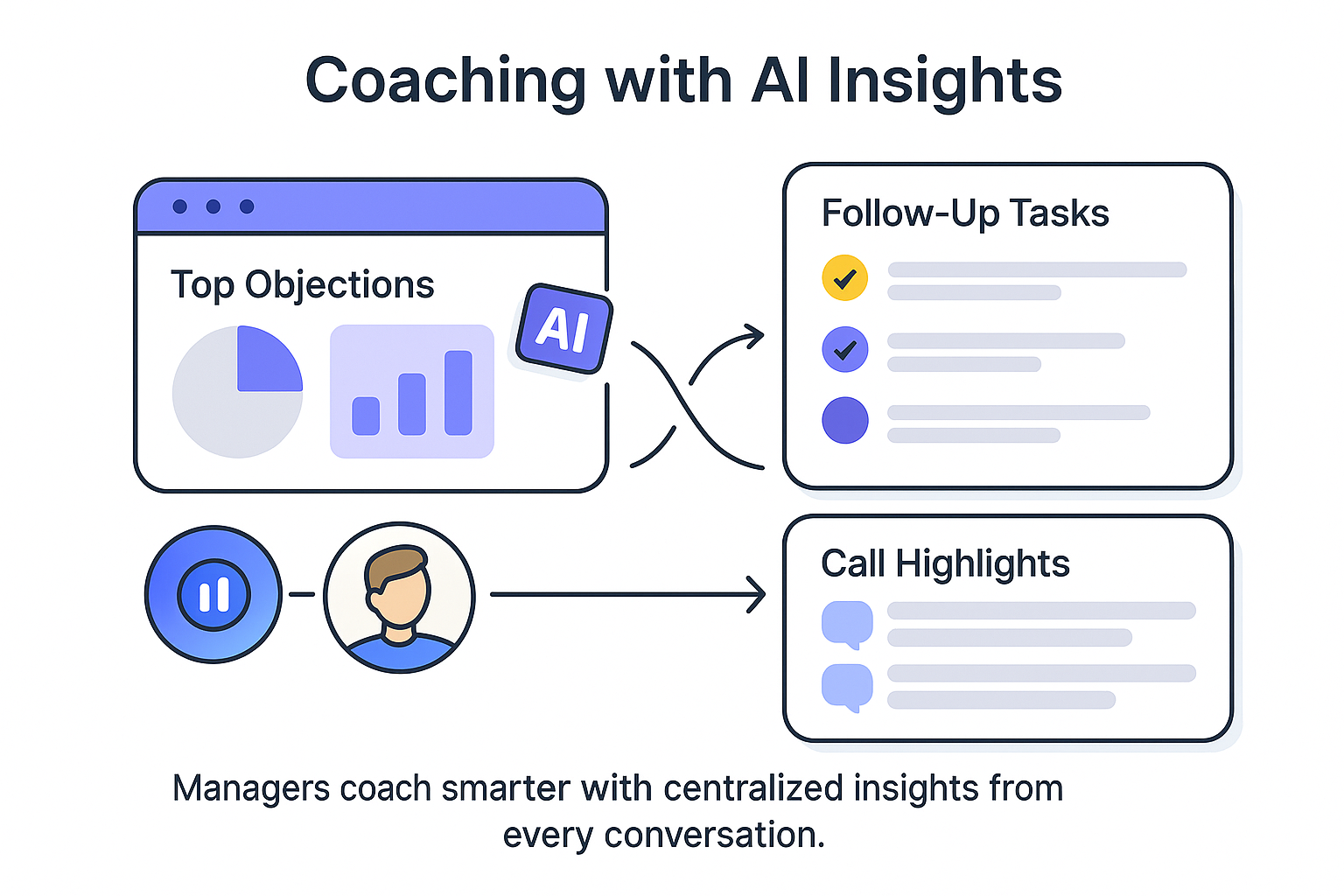 Sami AZ
Sami AZ
Great sales coaching is not about more meetings or reports. It is about visibility, timing, and precision.
Yet most sales managers still struggle to see what really happens in their team’s conversations.
According to HubSpot’s 2025 State of Sales Report, 68% of managers say they lack visibility into the quality of reps’ customer interactions, relying instead on self-reported notes or incomplete CRM entries.
That gap limits their ability to coach effectively, forecast accurately, and replicate success.
This is where AI meeting notes step in. Instead of manually reviewing call recordings or relying on sparse notes, sales managers can access real-time insights: what was said, how it was said, and what needs to happen next.
In 2025, AI is no longer just about automation. It is about sales intelligence, giving managers a clear window into conversations so they can coach with data, not guesswork.
Most sales managers juggle multiple roles: pipeline reviews, deal forecasts, call monitoring, and team performance tracking. But manual processes make this nearly impossible to sustain.
Here’s where things break down:
The result? Reps receive feedback that is delayed, inconsistent, and often disconnected from what actually happened in calls.
This is why many organizations are turning to AI meeting intelligence platforms like Klu, to automatically capture, analyze, and summarize conversations so managers can coach faster and more effectively.

AI meeting notes fundamentally reshape how managers understand and improve team performance.
Here’s how they do it:
Instead of relying on selective call recordings or rep summaries, AI automatically captures and transcribes every sales meeting across Zoom, Teams, and Google Meet.
Managers can instantly review key moments, objections, and commitments without watching an entire recording.
This creates a new level of transparency, one where coaching decisions are backed by actual customer interactions, not assumptions.
AI doesn’t just listen; it learns. It detects recurring phrases like “budget constraint” or “timeline delay” and highlights them across multiple calls.
Sales managers can see patterns such as:
This insight lets managers coach strategically instead of reactively.
Imagine reviewing a rep’s summary in Klu. You can instantly see:
Instead of general advice like “listen more,” you can give contextual coaching like “pause after objections” or “confirm timeline twice before moving on.”
Contextual coaching leads to faster improvement and stronger results.
Traditional deal reviews often involve long meetings where reps talk through pipeline updates. With AI meeting notes, managers already know what was discussed in recent calls.
Instead of “Tell me what happened with Acme Corp,” the conversation becomes “I saw Acme hesitated on the timeline, let’s discuss how to reposition the value.”
This makes reviews data-driven, shorter, and more actionable.
AI tracks every commitment made in calls, “I’ll send the pricing deck,” or “Let’s connect next Thursday.”
When tasks are missed, managers receive alerts so they can coach on accountability.
The AI acts like a digital assistant that remembers every promise made to prospects.
AI note systems create standardization across managers and teams. Every call summary follows the same structure, key points, objections, next steps, making it easier to compare performance and ensure consistency.
That means coaching is no longer subjective. Everyone plays by the same data rules.
When new sales managers join, they can review AI-generated summaries to understand deal health and rep performance immediately, no need for weeks of shadowing or report reading.
Implementing AI meeting notes delivers tangible benefits beyond time savings.
Managers can quantify what top performers do differently. For instance, they might find that high-closing reps spend 30% more time asking open-ended questions.
With this insight, coaching shifts from “be better” to “do what works.”
Every meeting is tracked, and every action item has an owner. Managers no longer chase updates or rely on reminders, AI makes follow-up transparent.
Because every conversation syncs directly into CRM, forecasting becomes based on real conversations, not outdated data.
Automating review processes lets managers focus on strategy instead of administrative review.

While several AI note tools exist, Klu is built for real-world sales management workflows.
Here is how Klu delivers superior coaching visibility:
Klu automatically records and transcribes every call across platforms like Zoom, Teams, and Google Meet. Managers never miss a moment, and every meeting is searchable by keyword or client name.
Instead of a raw transcript, Klu produces structured insights with sections such as “Key Topics,” “Next Steps,” and “Risks.”
This lets managers jump directly to what matters most.
All notes and tasks sync automatically to HubSpot, Pipedrive, or Attio. That means coaching sessions always use live CRM data, not stale summaries.
Klu tracks engagement patterns, talk-time ratios, and objection frequency to uncover behavioral insights. Managers can see how each rep communicates and how it impacts results.
Search across all past conversations for any topic, product, or prospect. Managers can instantly retrieve examples for training or deal review.
Klu ensures all captured data is encrypted, compliant with SOC 2 and GDPR standards, and accessible only to authorized team members.
This blend of automation, analysis, and compliance makes Klu an essential platform for forward-thinking sales organizations.
This process reduces meeting overhead and creates a real feedback loop between teams.
By 2025, coaching is evolving into a data-driven practice.
Managers are using AI not to replace their judgment but to amplify it, giving them faster access to facts, insights, and accountability.
As conversational AI models become more advanced, systems like Klu will begin providing predictive recommendations such as:
These insights will make coaching proactive instead of reactive, ensuring teams improve continuously.
Q1: How does AI meeting note analysis differ from simple call recordings?
Recordings require manual review. AI extracts insights automatically, saving hours and surfacing the most important details for managers.
Q2: Can AI detect tone and sentiment in sales conversations?
Yes. Klu’s language models recognize tone shifts and emotional cues, helping managers identify when deals are at risk or progressing positively.
Q3: How secure is call data with AI meeting note tools?
Klu ensures all data is encrypted both in transit and at rest, compliant with GDPR and SOC 2 standards.
Q4: Do managers still need to listen to full recordings?
Not necessarily. Summaries and highlights surface key parts of each call. Managers can still dive deeper into any section if needed.
Q5: Can this data be used for rep training?
Absolutely. Managers use past call summaries to train new reps, showcase successful techniques, and highlight patterns that lead to wins.
Sales managers succeed when they can see, understand, and guide. Yet manual note-taking, scattered data, and inconsistent reporting have long kept coaching reactive and fragmented.
With AI meeting notes, managers gain the visibility they always needed, instantly.
Every call is captured, every follow-up is tracked, and every pattern becomes actionable insight.
Klu brings it all together by syncing meetings, CRM data, and coaching workflows into one ecosystem.
It is not just smarter automation, it is the foundation for a new era of data-driven, accountable, and high-performing sales leadership.
When your managers coach with context and clarity, your entire sales engine runs faster, smoother, and more profitably.
Start today with Klu and transform every sales conversation into a coaching opportunity that drives results.